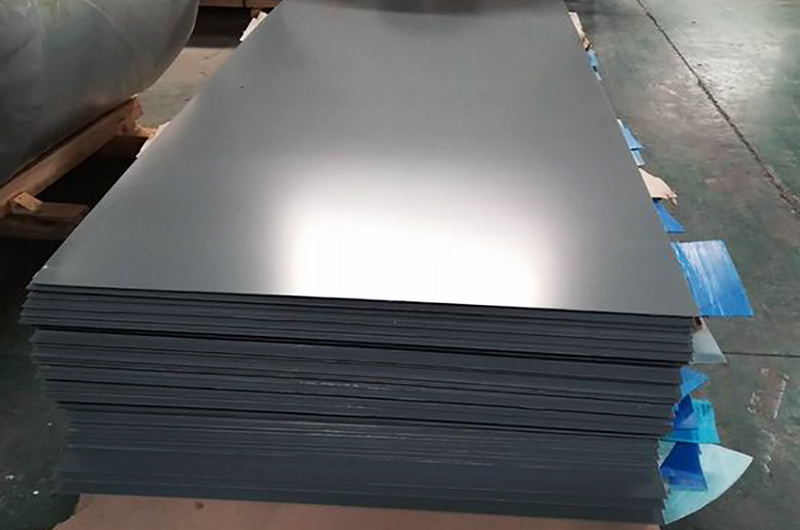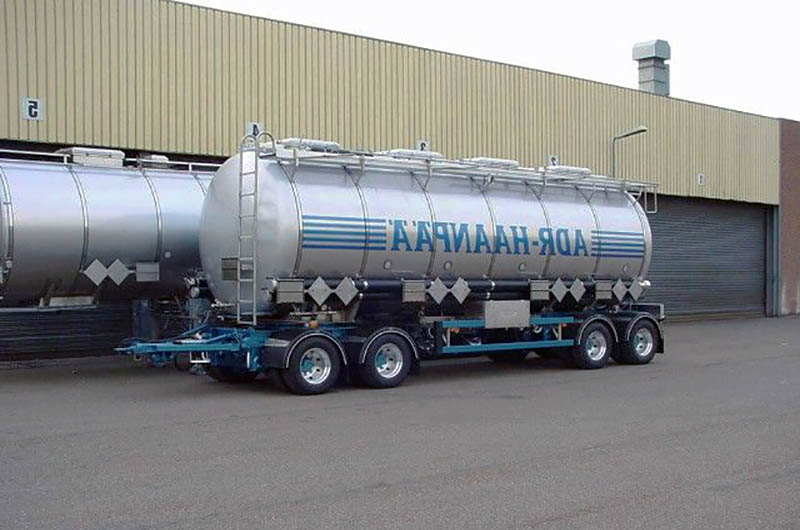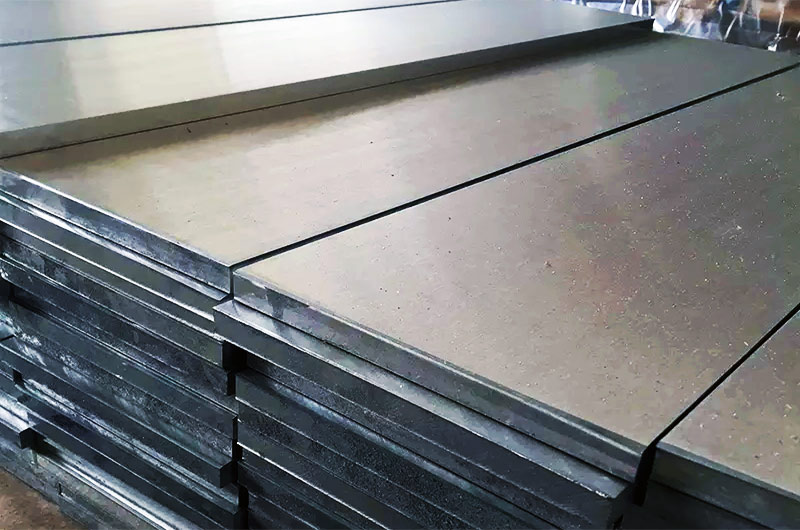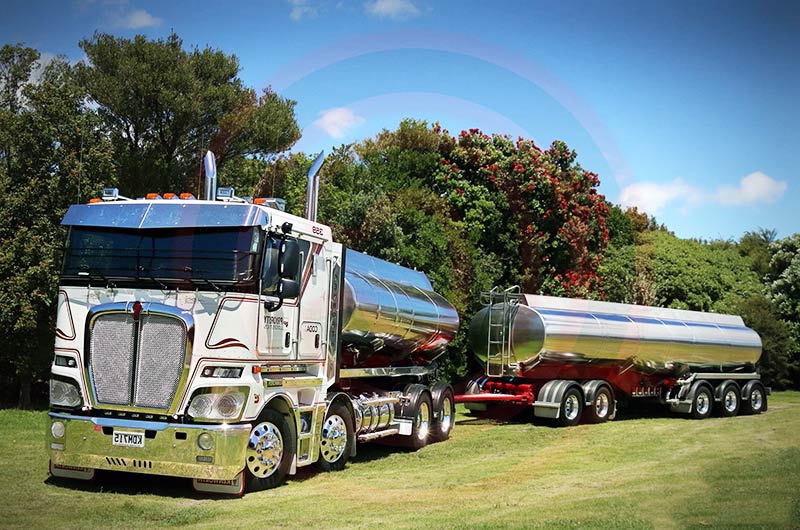Aluminum Plate for Tanker Head
Alloy: 5083/5086/5454 Long life and Recyclable
Due to its inherent strength and durability, steel has been the traditional choice for manufacturing tanker heads and bulkheads for many years. However, with the development of technology and material science, aluminum plates are currently being chosen more often.
The main reasons for turning to aluminum panels are the search for improved efficiency and performance. Aluminum is a lightweight material with a high strength-to-weight ratio, making it an attractive alternative to steel.

4 Reasons Aluminum Plates replace Steel for Tanker Head
1. Reduce the weight of the tanker front and the entire vehicle
Reducing the weight of the tanker head and the entire vehicle can improve cargo capacity and fuel efficiency. As fuel costs rise and environmental concerns become more pressing, the use of Aluminum Plate in tanker heads has become commonplace in place of steel.
2. Corrosion resistance
Aluminum's natural corrosion resistance is a significant advantage for tanker heads. Tankers often carry corrosive or abrasive cargoes, which can pose a serious threat to the structural integrity of the bulkheads.
Steel bulkheads are susceptible to corrosion and require regular maintenance and protective coatings. In contrast, aluminum is naturally corrosion-resistant, lasts longer, and requires less maintenance. This corrosion resistance is especially important when transporting hazardous materials, where leaks or structural failures can have catastrophic consequences.
3. Ease of aluminum plate manufacturing
An important consideration is ease of manufacturing. Aluminum sheets are relatively easy to machine, allowing for efficient and precise manufacturing of tank heads. This not only reduces production time but also helps save costs.
4. Aesthetics
Aluminum's aesthetics also make it increasingly popular. Aluminum surfaces can be easily polished and finished for a smooth and attractive appearance. Tank trucks are often noticeable on the road and can benefit from the improved aesthetics provided by aluminum.

Aluminum Alloy for Tanker Head
While the decision to use aluminum in the tank truck head structure is clear, the question is:
Which aluminum alloy should be used for this job?
Aluminum alloys are designed to offer a wide range of properties to suit a variety of applications. The choice of alloy can significantly affect the performance, strength and longevity of the bulkhead. Let’s discuss some of the aluminum alloys commonly used in can manufacturing and their respective characteristics.
5083 Aluminum Plate for Tanker Head
5083 is one of the most widely used aluminum alloys in the tanker industry. The alloy is known for its excellent corrosion resistance and excellent weldability. Its high strength combined with excellent performance in marine environments makes it the first choice for bulkhead construction.
Alloy 5083 is also known for its excellent formability, which simplifies the manufacturing process. It has good impact resistance and is suitable for applications where toughness is a priority.
These features make it particularly suitable for tankers transporting corrosive or seawater cargoes.
5086 Aluminum Plate for Tanker Head
Alloy 5086 is similar to 5083 in many aspects, including its corrosion resistance and weldability. It is often selected for can construction where the requirements closely match those of 5083 and the material is readily available.
It has good strength and toughness, making it a reliable choice for a variety of bulkhead applications.

5454 Aluminum Plate for Tanker Head
Alloy 5454 is another aluminum alloy commonly used in tank car head construction. It is known for its excellent corrosion resistance, especially in marine environments.
Like 5083, 5454 is weldable, making it a practical choice for bulkhead applications. It has good strength, impact resistance and formability.
A significant advantage of 5454 is its excellent resistance to stress corrosion cracking, which makes it the first choice for tanks transporting sensitive or corrosive liquids.
6061 Aluminum for Tanker Head
Although less common on tank truck heads, Alloy 6061 is still used in some applications. This alloy is known for its excellent weldability, high strength and good formability.
It is not as corrosion resistant as 5083 or 5454. It is often used where the bulkhead design requires specific structural properties and corrosion resistance is less important.
For example, where the cargo is less corrosive, Alloy 6061 may be a suitable choice.
7075 Aluminum for Tanker Head
Alloy 7075 is an aluminum alloy with excellent strength and toughness. It is mainly used in applications where high strength is critical and weight reduction is not as important.
When it comes to tank truck heads, Alloy 7075 is designed for special applications that require extremely high structural strength, such as tank trucks carrying very heavy or dense cargo.
It is critical to realize that each alloy has its own properties and trade-offs. The appropriate can alloy should be selected based on the specific needs of the application. Factors such as the type of cargo transported, the environment in which the tanker operates, required structural performance and budget constraints should be considered when making the decision.
Main Differences Between Aluminum Alloys
In order to make an informed choice, it is important to understand the key differences between the aluminum alloys commonly used in can construction. Here are some of the main differences:
1. Corrosion resistance
Different alloys exhibit varying degrees of corrosion resistance.
Alloys 5083 and 5454 are known for their excellent corrosion resistance, making them an excellent choice for applications where the cargo or operating environment is highly corrosive.
In comparison, Alloy 6061 is less corrosion resistant and should be used when corrosion is not a major issue.
2. Intensity
Aluminum alloys vary in tensile strength.
Alloy 7075 is the strongest of the above alloys, making it suitable for applications where structural strength is critical.
Alloys 5083 and 5454 provide a balance between strength and corrosion resistance, while Alloy 6061 was selected for its high strength but may lack the same level of corrosion resistance.
3. Weldability
The ease with which the alloy welds is an important factor in can manufacturing. Alloys 5083, 5454 and 6061 are all known for their good weldability, but Alloy 7075 presents a challenge in this regard.
4. Formability
The ability to form materials into desired shapes is critical in the manufacturing process. Alloys 5083, 5454 and 6061 are all highly formable, but 7075 is less formable due to its high strength.
5. Cost
The cost of alloys varies widely. Generally speaking, alloys with better properties (such as high strength and corrosion resistance) tend to be more expensive. Therefore, budget considerations also influence alloy selection.

How to Choose the Right Alloy for Tanker Head
Choosing the right aluminum alloy for a tank truck head is a decision that requires careful consideration. The selection should match the specific needs and priorities of the application. To facilitate this decision-making process, here are some steps to follow:
1. Determine the type of goods
The first and most critical step is to determine the type of cargo the tanker will transport. Consider the corrosive, acidic or any other potentially damaging nature of the cargo. This information will largely determine the level of corrosion resistance required of the alloy.
2. Operating environment
Assess the typical operating environment of a tanker. Tankers operating near the coast or in marine environments require alloys with excellent corrosion resistance, such as 5083 or 5454. Tankers operating in less corrosive environments may have greater flexibility in alloy selection.
3. Structural requirements
Consider the structural requirements of the tanker head.
Does it need to withstand high mechanical stress? If so, a stronger alloy such as 7075 may be required.
If structural strength is less of a concern, alloys such as 5083 or 5454 may be sufficient.
4. Budget constraints
Budget considerations are always a factor in material selection. While more corrosion-resistant and high-strength alloys tend to be more expensive, a balance must be found between performance and cost.
5.Welding and Fabrication
If the can design requires complex shapes or complex welds, ease of manufacturing becomes an important factor. If these aspects are important to the project, choose an alloy with good weldability and formability.
6. Weight Considerations
Evaluate the total weight of the tanker and the impact on fuel efficiency. Reducing weight can save money over time but should not compromise the structural integrity of the can.
7. Environmental impact
Given the increasing focus on sustainability and environmental responsibility, consider the carbon footprint of your chosen alloy. While all aluminum alloys are more environmentally friendly than steel due to their lighter weight, some alloys may offer additional environmental advantages.
8. Regulatory Compliance
Ensure that the selected alloy meets all relevant regulatory requirements for the transport of specific types of goods. Safety and compliance are critical in the transportation industry.
It's worth noting that decisions are not always straightforward and may require trade-offs. Depending on project priorities, there may be tradeoffs between factors such as corrosion resistance, strength, cost and environmental impact.
Solution: Choosing the Right Alloy for the Tanker Head
To illustrate the process of selecting the right alloy for a tanker head, we offer some solutions:
1. Tankers transporting highly corrosive chemicals
Faced with the problem: Corrosion resistance is crucial in this case, as leaks or structural failure can have catastrophic consequences. The operating environment may also involve exposure to corrosive materials. The structural integrity of the can is critical.
Solution: In this case, alloy 5083 or 5454 would be the most suitable choice. These alloys have excellent corrosion resistance, good weldability and adequate strength. While they may be more expensive than other options, the safety and long-term cost savings associated with reduced maintenance make them the alloy of choice for this application.
2. Tankers transporting non-corrosive food
Problems faced: The product is non-corrosive and does not pose a threat to the structural integrity of the tanker. In this case, the primary concern is maintaining product quality and meeting hygiene standards.
Solution: For this type of application, Alloy 6061 may be a suitable choice. It has high strength, good formability and moderate corrosion resistance. While it may not have the same level of corrosion resistance as 5083 or 5454, it is more cost-effective and provides the necessary structural strength for the application. Additionally, its ease of fabrication and lower cost make it a practical option.
3. Tankers transporting high-density liquids
Issues faced: The structural strength of the tanker bow is a primary concern as it is required to withstand the enormous weight and mechanical stresses associated with these cargoes.
Solution: In this case, Alloy 7075 would be a suitable choice. Its exceptional strength and toughness make it ideal for applications where structural integrity is critical.
While it may not be as corrosion resistant as 5083 or 5454, the cargo itself may not be corrosive and additional protective coatings may be applied to mitigate the risk of corrosion.
These case studies highlight how alloy selection depends on the specific requirements and priorities of each application. There is no one-size-fits-all solution and the selection process should be customized to the unique needs of the project.
Conclusion
The use of aluminum sheets in tank truck front and bulkhead structures represents a major change in the transportation industry. Aluminum's lightweight, corrosion-resistant and easy-to-manufacture properties make it a better choice than traditional steel, resulting in improved performance, cost savings and increased safety.
When selecting the appropriate alloy for a tank truck head, it is critical to consider factors such as cargo type, operating environment, structural requirements, budget constraints, welding and fabrication needs, weight considerations, environmental impacts and regulatory compliance.
The aluminum alloys used in these applications, such as 5083, 5454, 6061 and 7075, offer unique properties and advantages. Understanding the differences between these alloys is critical to making informed decisions and achieving the best balance of performance and cost.
Ultimately, alloy selection should be guided by the specific requirements of the application, ensuring that the tanker head is not only durable, but also efficient, safe and environmentally responsible.
Recommended content you might be interested in
-
5182 Aluminum Plate for Tanker
Specifically designed for tankers, our 5182 aluminum plate offers excellent corrosion resistance and high strength for reliable leak and splash protection.
-
5083 Aluminum Plate for Tanker
Our products meet the quality standards and complete specifications, choosing the right Tanker Aluminum Plate will not deteriorate or cause pollution in harsh environments.
-
5454 Aluminum Plate for Tankers
To ensure the safety and reliability of these tankers, the choice of materials is of utmost importance. Among the various materials available, 5454 aluminum plate has emerged as a popular choice due to its exceptional properties and benefits.
-
5754 Aluminum Plate for Tankers
5754 Aluminum Plate for Tankers Its light weight, corrosion resistance, durability and formability make it an ideal material for all types of tankers.
-
5059 Aluminum Plate for Tankers
The use of 5059 Tanker aluminum plates may become more widespread in tanker construction, contributing to a safer, more cost-effective and environmentally friendly transportation industry.
You might like the following content
-
5083 Aluminum Plate Sheet
5083 aluminum plate is a non-heat treatable alloy with high strength and corrosion resistance. We offer a wide range of sizes, thicknesses, and specifications at affordable prices to meet customer-specific needs.
-
5086 Aluminum Plate Sheet
5086 aluminum is not strengthened by heat treatment, but rather becomes stronger by strain hardening or cold machining of the material. 5086 aluminum sheet is commonly used in marine, cryogenic, pipeline, military, chemical and gas/oil/petroleum applications.
-
5454 Aluminum Plate Sheet
The strength of 5454 antirust aluminum is about 20% higher than that of 5052, and its characteristics are roughly the same as that of 5154, but its corrosion resistance is better than that of 5154 in severe environments.

